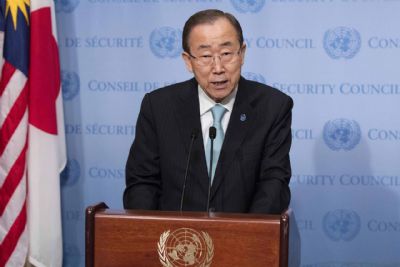"Although few Americans are paying attention, the race to succeed Ban Ki-moon as United Nations secretary-general is well under way. The first Security Council "straw vote" took place in July; the second on Friday. The actual election-involving one of Barack Obama's final significant foreign-policy decisions-is approaching rapidly because the new secretary-general's five-year term begins Jan. 1, 2017. Given the U.N.'s two-term pattern, Mr. Ban's successor could be in office longer than our next president.
Significant American interests are at stake. Picking the right secretary-general could mean finding, at last, a manager willing to take on the U.N.'s sprawling disorganization, bloated budgets, biased and ineffective bureaucracies, and outright corruption. Or it could mean planting a massive thorn in America's side, the greatest wish of this country's adversaries and of the supranational globalists who want to restrain the U.S...
This year's leading candidates come primarily from Central and Eastern Europe, reflecting the U.N.'s governance culture of rotating key jobs among regions. There is also renewed pressure to elect the first female secretary-general.
These two markers of identity politics made the early favorite Bulgaria's Irina Bokova, who is currently director-general of the U.N. Educational, Scientific and Cultural Organization (Unesco). In 1984, Ronald Reagan withdrew America from Unesco because of its contempt for freedom of the press, but the Bush administration rejoined in 2003, a self-inflicted wound.
Ms. Bokova, widely seen as Russian President Vladimir Putin's preferred candidate, is a rarity in post-Cold War Eastern Europe: She hasn't recoiled as far from Moscow's grasp as possible. She also enabled the Palestinian Authority's successful 2011 campaign to join Unesco as a member state, thus triggering the statutorily required elimination of all U.S. contributions. It was a telling episode. As Unesco's director-general, Ms. Bokova faced a clear choice: Did she want the U.S. as a full member of the organization, or did she prefer 'Palestine'?
Like President Obama and then-Secretary of State Hillary Clinton, Ms. Bokova showed indecision and cowardice during the Palestinian-provoked crisis. Despite her failures and likely subservience to Russia, her gender and geographic tickets could make her Mr. Obama's choice...
With important American interests on the line, we should welcome a competent manager, rather than an ideologue. But under President Obama, who knows?"
August 7, 2016
Who Will Lead the United Nations?

UN Secretary-General Ban Ki-moon (File photo)
Date
August 7, 2016
Title
Who Will Lead the United Nations?, The Wall Street Journal
Author(s)
John Bolton
